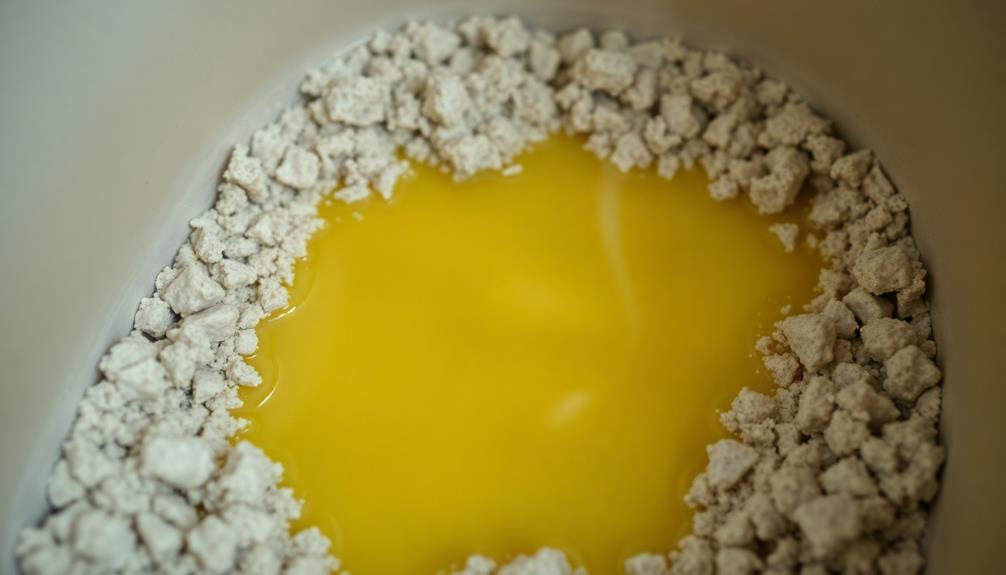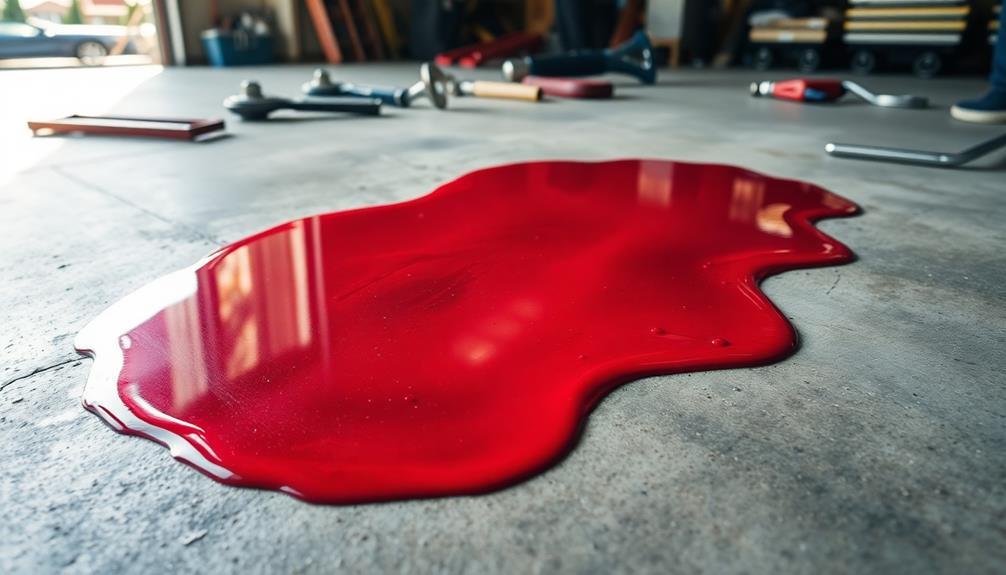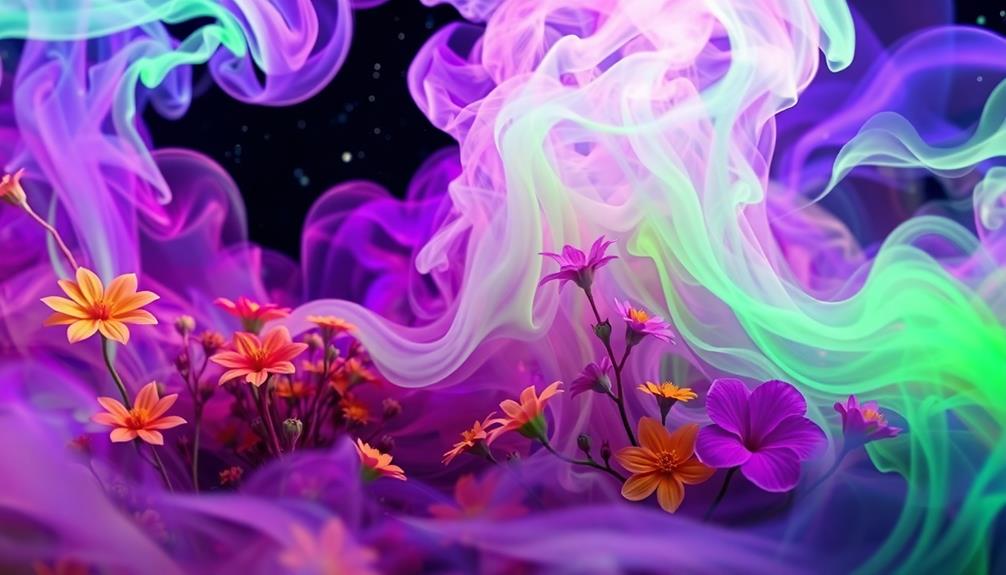Cat urine has a strong, pungent smell that often resembles ammonia. You'll notice it's less intense when fresh but can get worse as it decomposes. Unneutered males produce a stronger odor due to higher hormone levels, while healthy male cats have milder scents. The smell can include hints of juniper and mango. If you leave cat urine uncleaned, bacteria make the scent even worse, sometimes adding a skunk-like odor. It's essential to keep litter boxes clean and monitor any unusual smells, which might indicate health issues. Stick around to find more tips on managing cat odors effectively!
Key Takeaways
- Fresh cat urine has a less intense smell, but it quickly intensifies to a strong ammonia-like odor as it decomposes.
- Unneutered male cats produce a more potent odor due to higher levels of odorous compounds in their urine.
- Aging cat urine develops a foul skunk-like smell due to bacteria producing mercaptans, which require immediate cleaning.
- The unique scent of cat urine may also include hints of juniper and white spruce, contributing to its distinctiveness.
- Lingering ammonia odor from cat urine can pose respiratory health risks and may indicate the need for veterinary attention if unusual changes occur.
Introduction

When it comes to cat care, understanding the scent of cat urine is essential, as it can reveal a lot about your feline friend's health and behavior. The smell of cat urine is often strong and can remind you of ammonia, which is quite unpleasant. This odor can get even stronger as it breaks down, releasing mercaptans that create a smell similar to skunk spray. If the odor becomes particularly intense, it could indicate a medical issue such as a urinary tract infection or dehydration, both of which require veterinary attention. Additionally, territorial marking or “spraying” often has a distinct smell due to higher concentrations of pheromones. For new cat owners, it can be surprising to discover **what cat spray actually smells like**, which is typically more pungent and musky compared to regular urine.
If you have neutered male cats, you might notice their urine has a less intense odor compared to unneutered males, who tend to mark their territory with a more powerful scent due to higher testosterone levels.
Paying attention to the urine color is just as important. Healthy cat urine usually ranges from clear to pale yellow. If you ever detect any unusual changes in smell or color, it could signal underlying health issues that need your attention.
Concentrated urine can also lead to a stronger odor, so it's crucial to monitor your cat's habits. By keeping an eye on these factors, you can help ensure your furry friend stays healthy and happy.
Description of the Smell
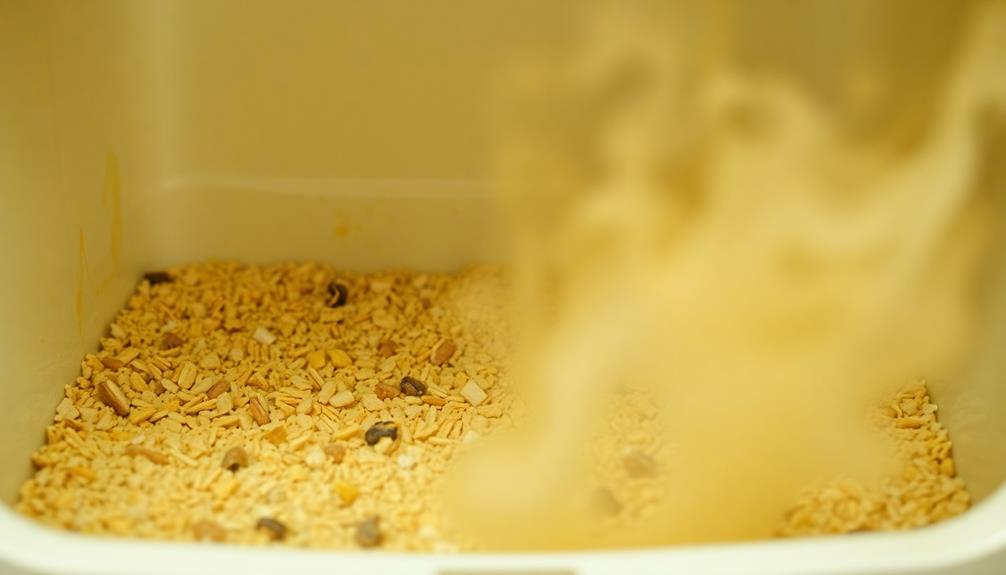
The smell of cat urine is unmistakable, often hitting you with a strong ammonia-like odor that's hard to ignore. This cat urine smell can be particularly pungent, especially if you're dealing with unneutered male cats. Their urine tends to have a more potent, stronger ammonia odor due to the higher testosterone levels.
Fresh cat urine usually has a less intense smell, but be warned—it can quickly change. As it sits and begins to decompose, the ammonia odor intensifies. Bacteria break down the urine, creating mercaptans that add a foul odor, reminiscent of skunk spray.
You might also notice a strange hint of juniper trees, white spruce, mangos, or even basil mixed in, making the cat pee odor a unique blend. The odor decomposition process is fascinating but not pleasant!
The longer the urine is left untouched, the more it releases that intensifying smell. If you ever find yourself in a room with cat pee, just remember: fresh cat urine smells different than the foul odor that comes after it sits for a while.
Source and Composition
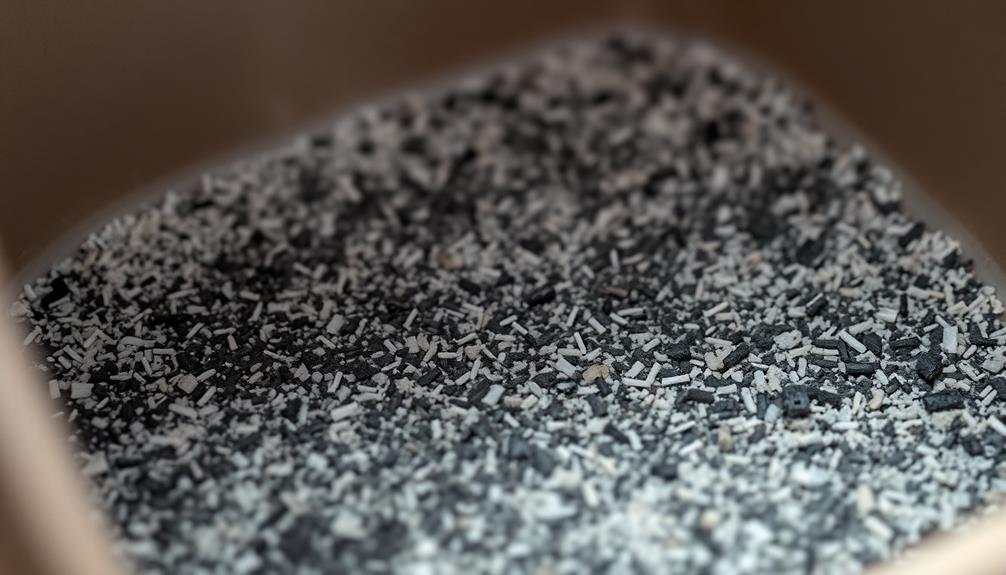
Understanding the source and composition of cat urine reveals why its smell is so potent and distinctive. Cat urine is about 95% water, but that remaining 5% is packed with interesting compounds. It includes urea, ammonia, uric acid, creatinine, and the unique feline amino acid called felinine. When felinine breaks down, it creates foul-smelling compounds, contributing to that distinctive odor you notice.
One reason cat urine has such a strong smell is its concentrated nature. Cats have efficient kidneys, which filter their urine more effectively than those of humans or dogs. This concentration means more odorous compounds are present!
If you leave cat urine uncleaned, bacteria can break down urea and release even more ammonia, intensifying the smell over time.
It's also important to note that unneutered male cats produce urine with a higher concentration of odorous compounds. This makes their urine smell much stronger than that of neutered males or females.
Typical Scenarios or Environments

Cat urine can be especially overpowering in certain scenarios and environments. The cat urine smell becomes particularly strong in enclosed spaces like litter boxes or small rooms. If you don't clean promptly, the ammonia odor can linger, even in well-ventilated areas.
When you add heat and humidity to the mix, the smell intensifies, making it even harder to ignore.
Outdoors, the situation can get just as bad, especially where unneutered male cats mark their territory. Their urine is concentrated, creating a powerful scent that can be quite unpleasant.
Inside your home, carpets and upholstery can trap these odors, leading to a persistent scent that's difficult to eliminate.
To tackle these tough scenarios, make sure to clean promptly after your cat uses the litter box. Consider using enzyme cleaners designed specifically for pet odors, as they break down the compounds causing the smell.
Emotional or Cultural Associations
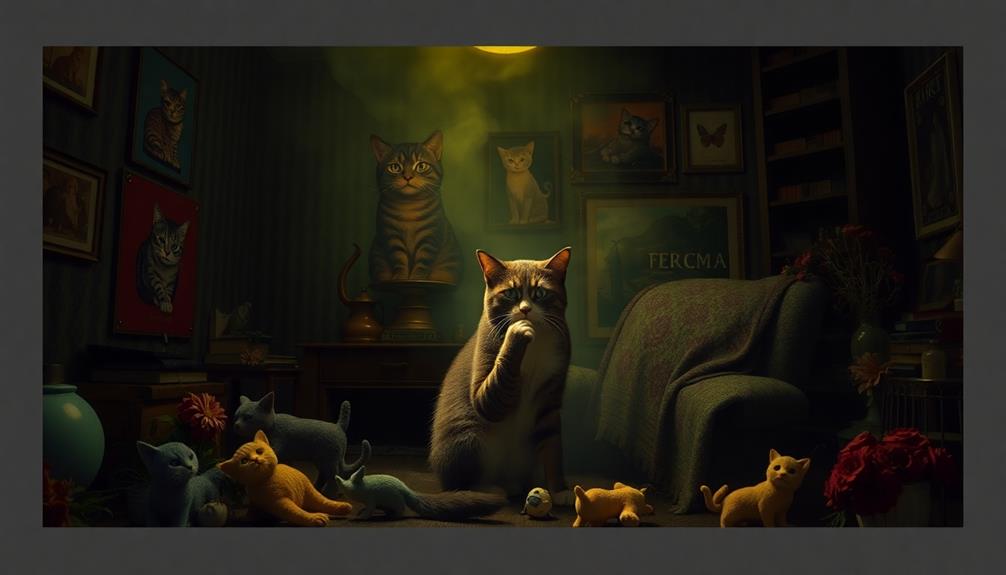
Beyond its pungent aroma, the smell of cat urine carries deep emotional and cultural associations that can shape your perception of felines. The strong ammonia odor often connects to ideas of cleanliness and territorial marking.
In many cultures, cat urine smell is linked with superstitions, where some believe it brings bad luck or signals danger. Your emotional reactions to this scent can vary greatly, influenced by personal experiences with cats. For some, the odor might evoke nostalgia, reminding you of cherished moments with pets. For others, it can trigger aversion or discomfort.
Cultural beliefs about cats can also impact pet ownership attitudes. While some societies embrace the unique scents of cat urine, others find them off-putting.
Additionally, the distinct smell has inspired artistic expressions, appearing in literature and visual arts as symbols of neglect or abandonment. This interplay of emotions and beliefs creates a rich tapestry of understanding surrounding the cat urine smell.
Health or Safety Considerations
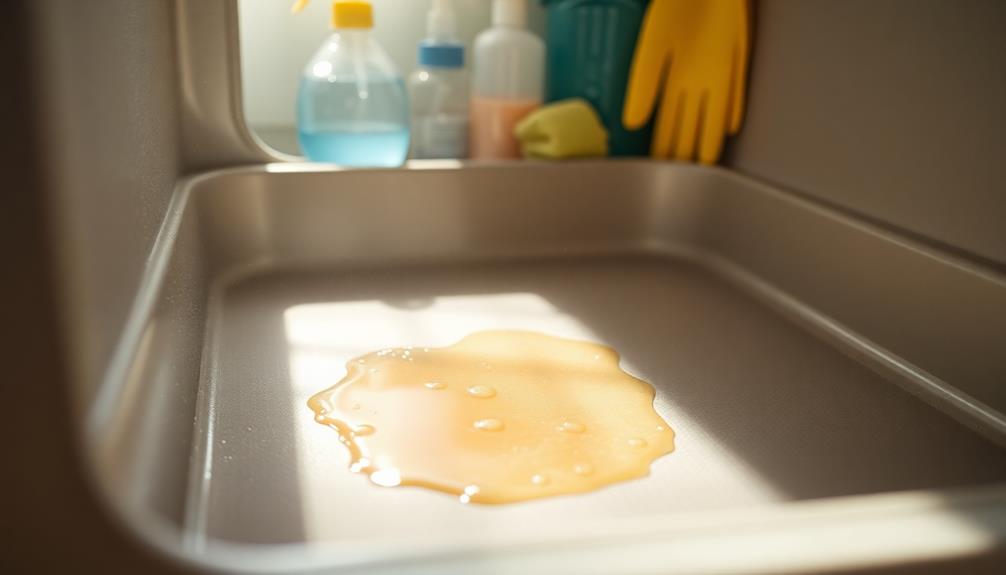
The strong ammonia odor in cat urine isn't just unpleasant; it can pose health risks if not addressed quickly. If you let that cat urine smell linger, it can lead to respiratory issues, especially in poorly ventilated areas.
People with allergies might've reactions that make them uncomfortable. Additionally, aged cat pee smells even worse due to mercaptans, which can resemble skunk spray. This indicates a need for immediate cleaning measures to keep your home safe.
Unneutered male cats often produce a more potent odor, so you may need to increase your cleaning routine and monitor your cat's behavior.
Regularly observing your cat's urine can reveal potential health conditions, like urinary tract infections or kidney disease. If you notice changes, it's important to consult a veterinarian for a quick check-up.
Final Thoughts

Addressing the challenges posed by cat urine odor is essential for maintaining a healthy living environment. The cat urine smell can be quite strong, especially if you have unneutered male cats. Their urine has a more potent ammonia odor due to hormones and territorial behavior.
Fresh, normal cat urine usually has a slightly pungent scent, but if you notice an unusual odor, it could signal health issues.
As cat urine decomposes, it releases mercaptans, creating a foul smell that can resemble skunk spray. This is why prompt cleaning is vital!
If your cat starts showing signs of frequent urination or changes in urine smell, it's best to contact your veterinarian. These changes might indicate bladder infections or other health concerns.
Frequently Asked Questions
What Does Normal Cat Pee Smell Like?
When you encounter normal cat pee, you'll notice a slightly pungent odor, not overpowering but still unpleasant. As it sits, the smell intensifies, becoming ammonia-like, especially if bacteria break down the urea.
What Smell Is Similar to Cat Pee?
When you think about smells similar to cat pee, you might notice strong ammonia scents or musky spices. Some say it resembles overripe mangos or even the earthy aroma of juniper trees. It's quite unique! Additionally, certain people compare the scent to garlic or pungent herbs, while others perceive a sour or acrid undertone in the air. This often leads to curious questions like, *what does a UTI smell like*, as distinct odors can sometimes hint at underlying health issues. While cat pee has its own unmistakable fragrance, changes in personal smells can signal the need for further attention.
How Can You Tell if Cat Pee Smells?
You can tell if cat pee smells by noticing a strong, ammonia-like odor. If you detect a sudden change, like a sweeter or fishy scent, it's time to consider a vet visit.
Does Cat Pee Smell Different Than Human?
Yes, cat pee definitely smells different than human urine. You'll notice it's much stronger and more pungent, primarily due to higher ammonia levels and unique compounds that give it that distinct, musky odor.
